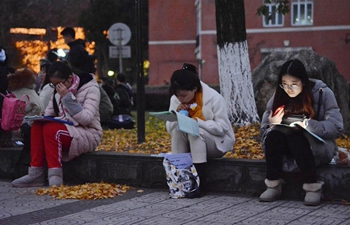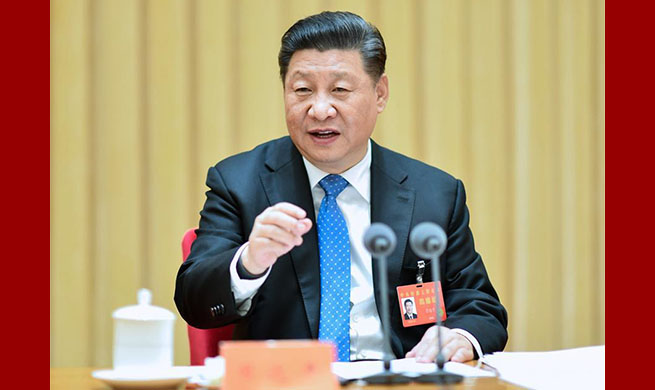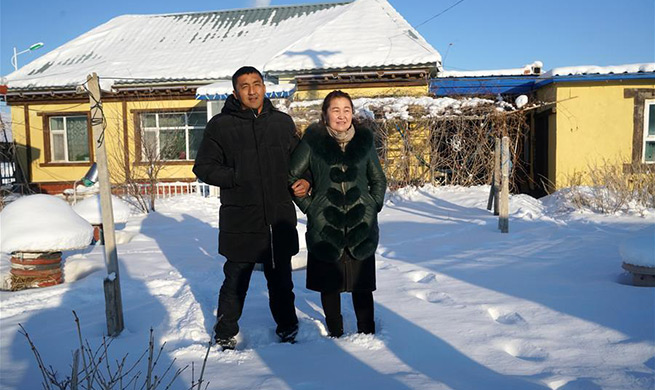GAZA, Dec. 23 (Xinhua) -- Palestinian observers believe that the announcement of Palestinian President Mahmoud Abbas to dissolve the Palestinian Legislative Council (PLC), dominated by Islamic Hamas movement, increases the legal and political debate in the Palestinian arena.
Observers warned that the Palestinian political system has descended into a "dark tunnel" thanks to intensifying internal polarization and the continued lack of national consensus, deepening the Palestinian division which has been ongoing since mid-2007.
Abbas announced on Saturday that the inoperative Palestinian Authority (PA) parliament, better known as the PLC, was dissolved.
He made the announcement in a speech addressed before a meeting for the Palestinian leadership, including Palestine Liberation Organization (PLO) Executive Committee and his Fatah Party's Central Committee.
The Palestinian Constitutional Court issued a decision of dissolving the PLC and to prepare for holding new parliamentary elections in the Palestinian territories within six months, said Abbas.
Hamas movement opposed the decision, saying it will deepen the internal Palestinian division.
Yehya Musa, a senior Hamas leader and member of the PLC, said in a press statement that the decision to dissolve the PLC does not have any value.
"The decision of Abbas deepens the internal Palestinian division and destroys the Palestinian political system," said Musa, adding that "the PLC will continue to work and convene as usual, regardless of Abbas' decision."
The PLC has been inoperative since the beginning of the internal Palestinian split between Hamas and Fatah in 2007, after Hamas violently seized control of the Gaza Strip and routed Abbas security forces.
Hamas, a majority in the PLC, has been unilaterally holding regular PLC sessions in the Gaza Strip amid the absence of Fatah Party members and other minor factions and political groups.
"PLC is completely disabled since the beginning of the internal division and its meetings are held in the Gaza Strip, which means that its decisions do not enjoy a consensus," Gaza-based political observer Akram Attallah told Xinhua.
Attallah said dissolving the PLC is a controversial step that will only perpetuate the internal division and widen the gap between the Hamas-ruled Gaza and the West Bank which is ruled by Abbas' Fatah party.
He stressed that the call for new elections "requires Palestinian consensus," adding that the absence of this consensus threatens the Palestinian situation as a whole.
Attallah warned of serious repercussions that may lead to deepening the constitutional vacuum in the Palestinian arena.
Hamas won last parliamentary elections held in 2006 and ousted the Fatah Party, which has dominated the PLC since its establishment in 1996.
For Ghassan al-Khatib, a professor of political science with Birzeit University in Ramallah, the next step is very important in order to assess the repercussions of the move.
"If dissolving the PLC is followed by a call for new elections, it is a step in the right direction, but if the legislative powers are transferred to the Central Council of the PLO, it is a step in the wrong direction," al-Khatib explained.
He added that the powers of an elected council cannot be transferred to the un-elected one, which will further exacerbate the division that has deepened over the past 11 years.
"As long as Abbas dissolved the Legislative Council, he must call for legislative elections within six months," he stressed.
Since the beginning of the internal Palestinian division, holding new elections has been a frequent talk in the Palestinian reconciliation understandings without translating it into real procedures.
Several agreements on Palestinian national reconciliation have been reached under the sponsorship of Saudi Arabia, Qatar and Egypt in the past years, but none of them has resulted in a tangible breakthrough to end the division.
Last October, Hamas and Fatah signed an Egyptian-sponsored reconciliation pact in Cairo to heal their prolonged rift.
Under the deal, Hamas should fully hand over its power in Gaza to the Ramallah-based consensus government last December. But the differences between the two sides forced a delay in the implementation of the deal until further notice.
Hani al-Masri, director of the Ramallah-based Masarat Center for Research and Studies, said that the declaration of dissolving the PLC accelerates the transformation of the division into separation.
"We are facing a reality with the presence of two authorities and two leaderships, each of which claims legitimacy," al-Masri told Xinhua.
On the call for new elections, al-Masri stressed that the only way to hold elections at all levels is to end the division and restore unity so as to unite the national institutions.
"Holding elections is impossible as long as the state institutions are not unified," al-Masri added.

















